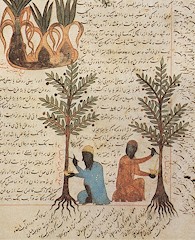
Quick Facts
Biography
Ibn Bassal (1085 C.E.) was a Moorish botanist and agronomist in Toledo and Seville, Spain who wrote about horticulture and arboriculture. He is best known for his book on agronomy, the Dīwān al-filāha (The Court of Agriculture).
Life and work

Abu Abdullah Muhamed Ibn Ibrahim Ibn Bassal worked in the court of Al-Mutamid, for whom he created the Hā’īṭ al-Sulṭān botanical garden in Seville. He travelled (on pilgrimage) to the Hejaz, visiting Egypt, Sicily, Syria and seemingly also countries from Abyssinia and Yemen to Iraq, Persia and India. He returned with knowledge of the cultivation of cotton, and he may well have brought seeds and plants with him for the Toledo botanical garden. He is best known for his book on agronomy, the Dīwān al-filāha. He also wrote the treatise The Classification of Soils which divided soil fertility into ten classifications.
The Dīwān al-filāha
Ibn Bassal's practical and systematic book Dīwān al-filāha (The Court of Agriculture) lacks references to other agronomists, and appears to be a record of his own experience. In the book, he describes over 180 cultivated plants, including chickpeas, beans, rice, peas, flax, henbane, sesame, cotton, safflower, saffron, poppies, henna, artichoke; herbs and spices including cumin, caraway, fennel, anise, and coriander; vegetables requiring irrigation or plentiful watering such as cucumbers, melons, mandrake, watermelons, pumpkins and squash, eggplant, asparagus, caper, and colocynth; the root vegetables carrots, radish, garlic, onion, leek, parsnip, the Sudanese pepper, and the dye-yielding madder; leaf vegetables including cabbage, cauliflower, spinach, purslane, amaranth and chard. He also covers arboriculture, detailing the propagation of the palm, olive, pomegranate, quince, apple, fig, pear, cherry, apricot, plum, peach, almond, walnut, hazelnut, grape, citron, orange, pistachio, pine, cypress, chestnut, holm-oak, deciduous oak, tree of paradise, arbutus, elm and ash.
Legacy
Ibn Bassal's works were studied several centuries later by Abu Jafar Ahmad Ibn Luyūn al-Tujjbi (d.1349) of Almeria who based his treatise Kitāb Ibdā' al-malāha wa-inhā' al-rajāha fī usūl sinā'at al-filāha on Bassal's work.
